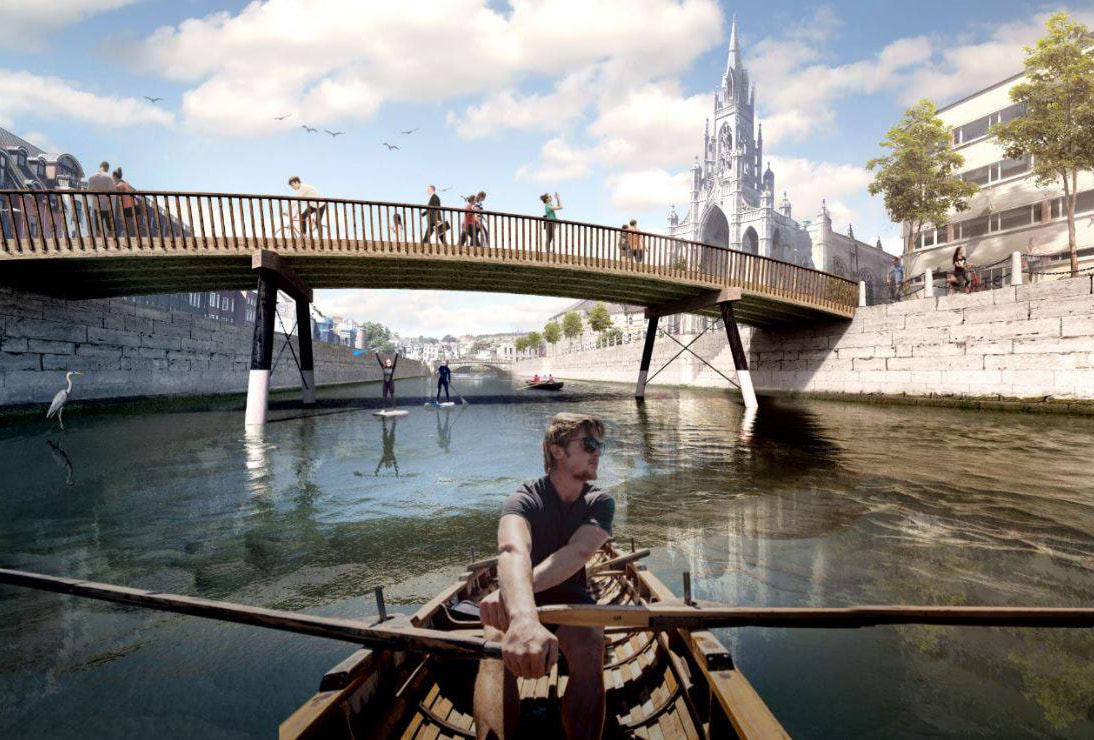It’s a busy city, but there is a melancholy sweetness along the river on June or September evenings, the city tranquil, the river full, sunset softening the high houses on the ridge of the Northside. There is a watery quality to the light, good days or bad, and a shimmering, dancing wit in the people which I have always felt was related to the the three waters of bog, river and the proximate ocean
The river is confined within stony banks but nevertheless the city floods. Not just the rare occasions when the mountains pour into the Lee and the river overspills its banks, but more frequently from the sea surging up through the old buried channels and out through every opening, penetrating the old streets in places like Morrisson’s Island, The Marsh or The Coal Quay.
There is water inside and outside the old walls and, it seems, water is under the city too, a deep hidden second River Lee and a huge aquifer that means the city is essentially a watery raft floating on a geological mirror of the surface.
The recent Office of Public Works (OPW) proposal for flood-protection will do irreparable damage to this old city. The walls will replace old cast-iron railings, old cut limestone, stretches where the river is open. They will block the vista of the river that is so central to how Cork thinks of itself. They will wall the river out and wall the floodwaters in – so much so that the OPW plans pumping stations to vent the sea-flooding into the river. If it works it will feel like being inside a flooded prison. If projections for rising sea levels due to climate change come true the wall will be taller than the average person. Wherever you go in the city, open vistas will become blank walls.
This is my first objection to the Cork wall. It will change the nature of the city’s relationship with the river. It will be ugly and it will be forbidding.
But this is all assuming the wall will work. This report suggests otherwise. Walls fail, the Dutch say, and they should know a few things worth knowing. And these walls are to be built on marshy ground, on a raft floating on an aquifer, with holes that channels directly to the sea, a giant dam upstream that once caused a catastrophic flood when the rainfall in the in the Lee catchment almost overwhelmed it (extreme weather events are predicted to be more frequent as the planet warms).
This is my second objection: Cork is not a city ideally suited for such a project.
I know nothing about engineering but I do know something about logic. Imagine a situation where a complex large storm brings torrential rain on the catchment air and then or later, high south-easterly winds and exceptionally low pressure. I remember one such storm. The rain swells the river, perhaps following on a period of heavy rain and therefore already high. The south-easterly wind drives the sea up the harbour and into the city (this is actually what happens, not a speculation). Low barometric pressure allows the ocean to ‘spring back’ since the pressure of the column of air holding it down is lessened, thus allowing the tide to rise. These events are sometimes called ‘super storms’, but it is worth reminding ourselves that they are not unheard of on this little rock facing the Atlantic, and we can expect more of them as the planet warms.
Imagine then a large release of water from the dam, the river in spate exploiting a weakness in the wall. The Dutch Government warns that flood defence walls always fail at some point. The floodwaters pour through the city just as the sea comes up through the old channels. The walls now turn the city into a basin, trapping the water within. There will be pumping stations to help evacuate the water, I am told, but by the time the pumps are needed the city is already flooded.
Unlikely, you say, but nevertheless possible. Logic tells us that there are two factors to weigh in relation to a risk: the probability of an accident and the magnitude of the damage. It would be criminal, for example, to build a house that was not earthquake ready on the grounds that the last earthquake was a long time ago. We might see such a storm once in a hundred years, but when did the clock start ticking? And why should we visit our calamity on future generations?
This is my third objection: The magnitude of the catastrophe should the walls fail outweighs all considerations as to frequency. In any case, frequency of extreme weather events will increase as the planet warms, this what all the science tells us.
There are more complex possible solutions: care for, protection of, and even development of flood-plains up river; improvements in dam management and the management of the reservoirs upriver; most technically challenging, a tidal barrier downstream of the city. None of these, of course, will shovel money into the pockets of the builders, and in this country the one group of people who must be kept happy are the builders.
This is my final objection: A beautiful, tiny jewel of a city is to be sacrificed so the OPW can practise its block-laying skills.
Save Cork City
This post is from The Ice Moon by William Wall (@wiliamwallbook). The post was called ‘Prison Walls for a River’. William Wall is the 2017 winner of the Drue Heinz Prize for Literature. He has also won the Doolin Prize for poetry, Virginia Faulkner Award, The Sean O’Faoláin Prize, several Writer’s Week prizes and The Patrick Kavanagh Award. You can access more of his writing including free books and essays @ http://williamwall.net/
The picture used is taken from http://savecorkcity.org/ which is a site opposing the OPW’s Wall Scheme.


 RSS Feed
RSS Feed
